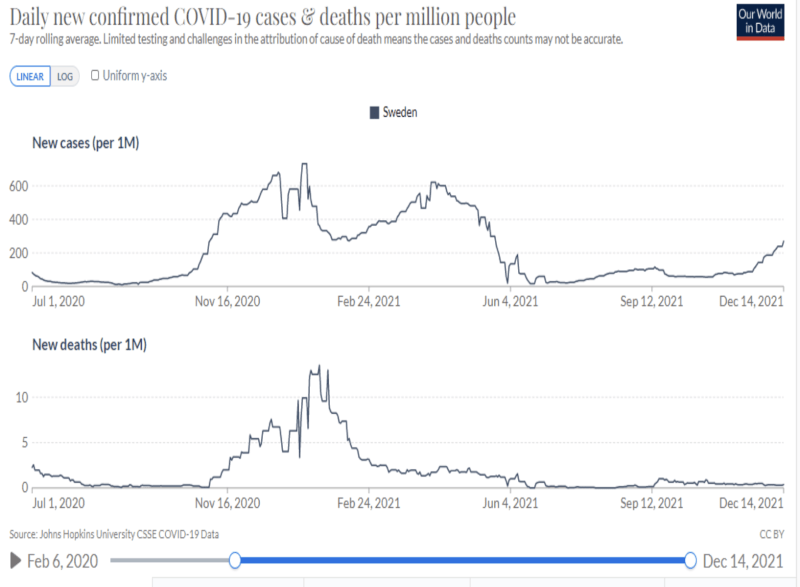With the seasonal increase in Covid infections in the Northern United States, vaccines are important to keep the death counts down. To save lives, nothing is more critical than to ensure mass vaccination of older people who haven’t yet had Covid.
While the protection against infection and disease wanes a few months after vaccination, the protection against hospitalization and death is more durable and wanes more slowly. Hence, we should urge all older people who have not yet had Covid to get the vaccine as soon as possible. When the booster shots were approved by the FDA, we knew very little about their efficacy, but a recent observational study suggests that they reduce the risk of both infection and severe disease for those without prior infection.
While anyone can get infected, there is more than a thousand-fold difference in mortality risk between the old and the young. In 2020, public health officials and the public discourse focused on lockdowns, such as school closures, business closures, travel restrictions and working from home mandates, while there was very little effort to better protect high-risk older people.
We are now making the same mistake again. Instead of intensifying efforts to vaccinate more of our older citizens, most of whom are retired, the public discourse is focused on vaccinating children and vaccine mandates for students and working age adults, many of whom already have natural immunity after Covid recovery.
Earlier this year, I was censored by Twitter for writing that “Thinking that everyone must be vaccinated is as scientifically flawed as thinking that nobody should. COVID vaccines are important for older high-risk people, and their care-takers. Those with prior natural infection do not need it. Nor children.”
Unfortunately, we have entered a tug-of-war between vaccine fanatics who want to vaccinate everyone and vaccine skeptics. The biggest battlegrounds are children and work-place vaccine mandates, while the old are forgotten once again. Forgotten and left to die.
Vaccine fanatics and vaccine skeptics have one thing in common. Together, they have contributed to a level of vaccine hesitancy never seen before in the United States. What the latter failed to accomplish over several decades, the vaccine fanatics have achieved in less than a year. How? Here are some examples:
We have known about natural immunity since at least the Athenian Plague in 430 BC, and studies show that the Covid recovered have stronger immunity than the vaccinated. People know this, and by mandating vaccines for those that are already immune, public health officials are undermining trust with the result that people are skeptical of other vaccine recommendations.
For older people, who are at high risk of dying from Covid, the benefit of the vaccine greatly outweighs the small risks of a serious adverse event, so it is a no-brainer to be vaccinated.
The same is not true for children. Their Covid mortality risk is miniscule and less than the already low risk from the annual influenza, so the vaccine benefit for healthy children is very small. It will take a few years until we know the Covid vaccine risk profile, and until then, we do not know whether there is more benefit or harm in vaccinating children. When government officials ignore these important issues, trust in vaccines declines among everyone.
There are some health risks with most drugs and vaccines. It is natural that everyone, including vaccine skeptics, want reliable data on this, and it is important to both monitor and be honest about it.
With the exception of the Vaccine Safety Datalink project, the CDC has struggled with this during the pandemic. For example, because of some reported blood clots among younger vaccinated women, CDC put a pause on the use of the Johnson & Johnson vaccine that included older Americans who really needed it, despite evidence that there was no risk for those above 50.
As another example, CDC is releasing raw counts from the Vaccine Adverse Event Reporting System (VAERS) without distinguishing between counts that are above versus the same as one would expect by chance. By doing so, CDC is not properly evaluating potential adverse reactions while inadvertently inviting people to erroneously think that every reported adverse event was caused by the vaccine.
All of this reduces vaccine confidence.
Globally, we still have a vaccine shortage. Many older people in the developing world are dying of Covid because vaccines are unavailable to them while young low-risk American and European students proudly post their vaccination shots on Instagram. This is disturbing. When such unethical behavior is not countered by public health officials, they lose trust; especially among immigrant communities.
Some politicians, scientists and journalists are trying to score points by labelling others as anti-vaxx. For example, in an attempt to discredit the Great Barrington Declaration, the British Medical Journal published and refused to correct false accusations that I and my colleagues are against mass vaccinations, even though I am probably the only person that has been fired by CDC for being too pro-vaccine.
To falsely credit the anti-vaccine movement with support from professors at Harvard, Stanford and Oxford is irresponsible, as such erroneous information is eagerly reiterated by vaccine skeptics and spread on social media.
The successful use of Covid vaccines can be seen in Sweden, who aggressively prioritized vaccination by age, even firing a healthcare administrator who took the vaccine out-of-turn. Last winter, there were two distinct waves of Covid infections, peaking in January and April respectively. During the January peak, before vaccines were available, there was also a Covid mortality peak. During the April peak, after many older people had been vaccinated, there was no corresponding peak in mortality.

We should stop using vaccines as a weapon in political and cultural fights. During a pandemic, we must care about everyone irrespective of their political views and socio-economic standing. That is what a mature country does. Since we do care, we should intensify efforts to vaccinate every older American.
Making the vaccine freely available is not enough. We must honestly explain how the vaccine can save their lives even though others, such as their younger family members, may reasonably not want the vaccine. We must especially intensify outreach to hard-to-reach Americans in rural areas and to those that are poor or homeless.
Rather than forcing the vaccine on the young or those with natural immunity, we should focus on vaccinating more older Americans, as well as older people in other countries. That is what will keep the mortality numbers down. That is what will keep our country together. It may even help keep the world together.
Published under a Creative Commons Attribution 4.0 International License
For reprints, please set the canonical link back to the original Brownstone Institute Article and Author.









